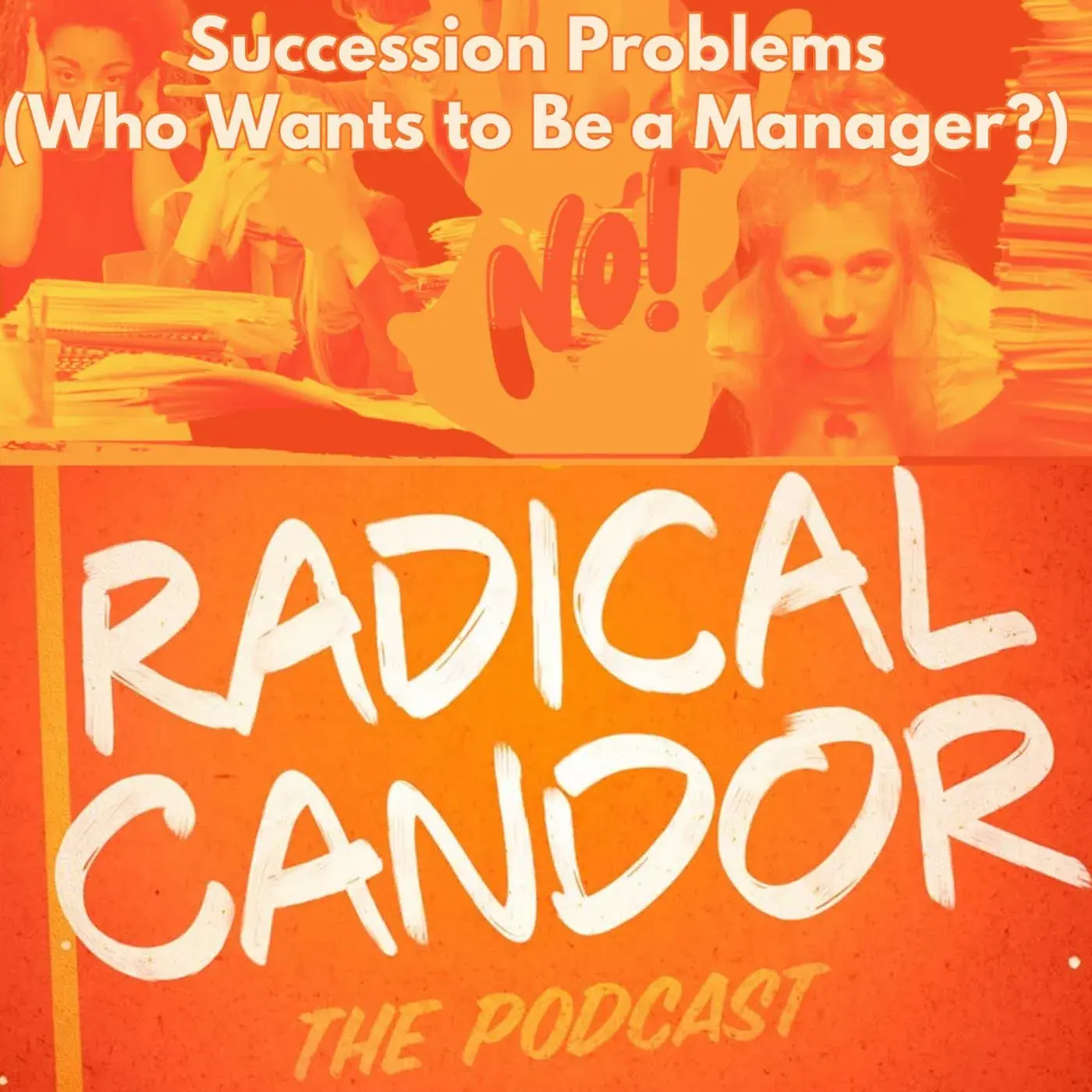What Do Managers of Managers Do? (The Crank Call From Kim) 4 | 16
Does anyone actually want to be a manager of managers? And if so, what do these people actually do? On this episode of the Radical Candor podcast...
6 min read
Brandi Neal Apr 3, 2024 12:01:51 AM

Let's play, 'who wants to be a manager?!' We’ve talked about knowing whether or not being a manager is right for you and manager burnout, but what if no one wants to be a manager at all? Kim, Jason, and Amy discuss the challenges and motivations for becoming a manager. They explore the survey results that show a lack of interest in people management, the reasons behind it, the role of middle managers, and the emotional labor involved in being a manager.
Listen to the episode:

@kyyahabdul Stitch with @Robyn L Garrett #kyyahabdul #corporateamerica #climbingtheladder ♬ original sound - Kyyah Abdul
*Our robot makes some mistakes—listen to the episode for a 100% accurate account of the team's conversation.
Why many employees don't want to become managers.
Almost two-thirds of employees surveyed by Visier do not want to become people managers due to lack of work-life balance and unpaid internship responsibilities.
Work-life balance and management roles.
Kim Scott and Amy Sandler discuss the idea of becoming a manager for money versus doing the work that managers do for the right reasons.
The top reasons why individual contributors don't want to become managers include increased stress and pressure, according to a survey.
People should not become managers if they're not interested in doing the work, such as having one-on-ones and career conversations.
Emotional labor and leadership during uncertain times.
Jason Rosoff notes that emotional labor has increased in recent years, particularly in the US, as people struggle to cope with the pandemic and social justice issues.
Rosoff believes that managers are now more focused on supporting employees' emotional well-being, rather than just inspiring them to follow through on commitments.
Leadership, trauma, and middle management challenges.
Kim Scott: Leadership training in the military emphasizes taking care of people, including their mental health.
Jason Rosoff and Amy Sandler: Middle managers face unique challenges, including lack of control over decisions and limited support from peers and HR.
Kim Scott advises communicating a disagreed decision by understanding the rationale behind it, even if you still don't agree.
Middle managers are in a difficult spot due to increased responsibilities and lack of support, according to research shared in Fortune.
Managerial responsibilities and emotional labor.
Jason Rosoff and Kim Scott discuss the emotional labor of managers during the pandemic, with Kim sharing a personal anecdote about spending time with employees dealing with personal crises while trying to make a pricing decision.
Kim's coach reminds her that emotional labor is central to the job of management, not just an extra task.
Jason Rosoff suggests that people are more willing to reveal their personal crises at work, leading to a perceived increase in the frequency of crises.
Kim Scott and Amy Sandler discuss the need for companies to redefine the role of managers and provide guidance on how to make the role more attractive.
Kim Scott and Amy Sandler discuss the challenges of being a middle manager, including emotional labor and the blurring of lines between individual contributor and people manager roles.
Jason Rosoff adds that while some companies may allow for a player-coach role, most do not properly allocate resources for this hybrid position.
Management styles and expectations.
Kim Scott advises new managers to avoid expecting direct reports to blindly follow orders, as this can lead to ineffective management and personal regret.
Managers must balance leadership and hands-on work to be effective thought partners.
Redefining the role of a manager.
Amy Sandler and Kim Scott discuss the motivations of people managers, with Sandler highlighting the importance of pay and benefits, while Scott emphasizes the need for a genuine interest in the job.
The two also touch on the issue of employee ambition, with Sandler questioning whether there are enough opportunities for career advancement in management roles.
Amy Sandler and Jason Rosoff discuss the lack of clarity around the role of a manager in organizations, leading to a "double bind" where managers are expected to perform tasks without proper training or support.
Kim Scott expresses frustration with the lack of understanding of what managers need to do, and the absence of an apprenticeship model for managers to learn and grow in their roles.
Kim Scott and Jason Rosoff discuss the challenges of becoming a manager, including the need to define the role and provide opportunities for experience.
They suggest creating a buddy or mentorship program to give employees a taste of management and help them determine if it's a career objective for them.
Leadership, management, and teamwork.
Kim Scott recounts two moments in her career where she was inspired by a manager's approach: one at a diamond company and another during the Tylenol poisoning crisis.
Amy Sandler asks Kim about her own inspirational experiences, leading Kim to share stories of her boss in Moscow and the CEO of Tylenol during a crisis.
Amy Sandler and Jason Rosoff discuss the importance of aligning a team towards a common goal, with Amy highlighting the power of creating a shared vision and Jason emphasizing the value of giving credit to the team for successfully navigating challenges.
Kim Scott shares a memorable moment of exaltation when a team member returned from an extended absence and contributed to a meaningful discussion, highlighting the joy of working with people towards a common goal.
Managing teams with Radical Candor approach.
Amy Sandler shares a story of unlocking creativity in a team member through consistent encouragement and painting a picture of possibilities.
Kim Scott and Amy Sandler discuss tips for effective people management, including defining the role, creating a mentorship program, and providing training resources.
@ishouldawent2tradeschool #womenintech #blackwomenintech ♬ Running Up That Hill (A Deal With God) [2018 Remaster] - Kate Bush
Have questions about Radical Candor? Let's talk >>
Follow Us
Instagram
TikTok
LinkedIn
YouTube
Facebook
X
————————————————————————————————————————————————————————————–
You’ll get an hour of hilarious content about a team whose feedback fails are costing them business; improv-inspired exercises to teach everyone the skills they need to work better together, and after-episode action plans you can put into practice immediately.
We’re offering Radical Candor podcast listeners 10% off the self-paced e-course. Follow this link and enter the promo code FEEDBACK at checkout.
We’re excited to announce that Radical Candor is now available as an hour-long videobook that you can stream at LIT Videobooks. Get yours to stream now >>

Episodes are written and produced by Brandi Neal with script editing by Amy Sandler. The show features Radical Candor co-founders Kim Scott and Jason Rosoff and is hosted by Amy Sandler. Nick Carissimi is our audio engineer.
The Radical Candor Podcast theme music was composed by Cliff Goldmacher. Order his book: The Reason For The Rhymes: Mastering the Seven Essential Skills of Innovation by Learning to Write Songs.
Download our free learning guides >>
Take the Radical Candor quiz >>
Sign up for our Radical Candor email newsletter >>
Shop the Radical Candor store >>
Get Radical Candor coaching and consulting for your team >>
Get Radical Candor coaching and consulting for your company >>
Meet the team >>

Does anyone actually want to be a manager of managers? And if so, what do these people actually do? On this episode of the Radical Candor podcast...

On this episode of the Radical Candor Podcast, we're taking a break from our GSD Wheel series and welcoming back to the podcast Russ Laraway, author...

Kim, Jason, and Amy discuss a listener's question about how to confront and disrupt bias in management at work for women working in male-dominated...